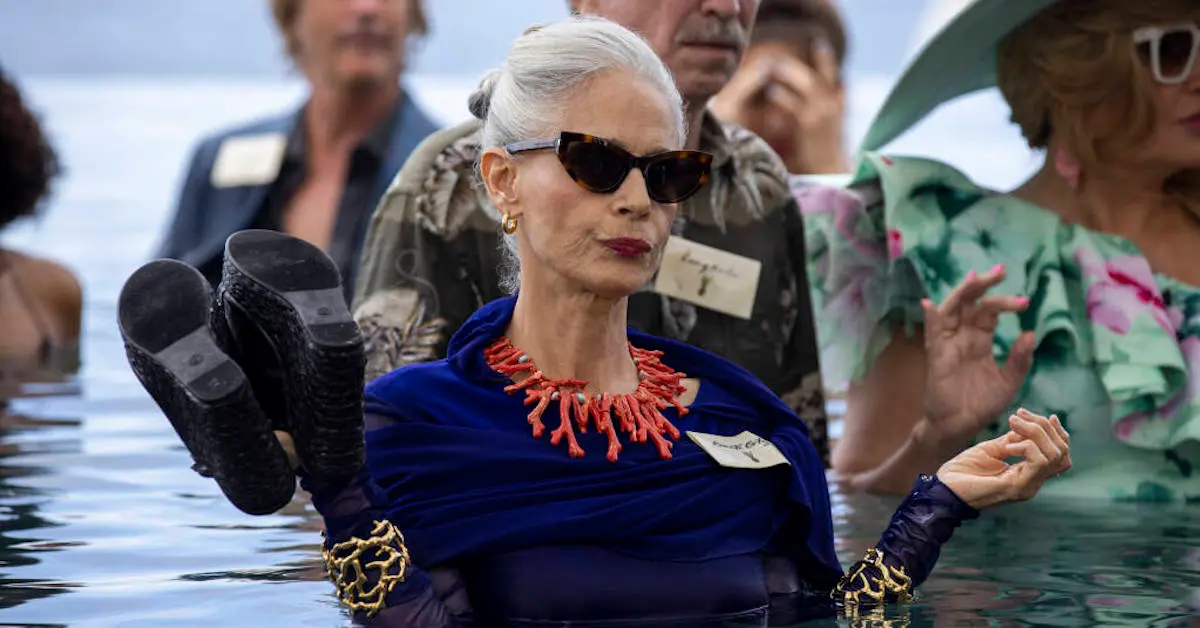Cate Blanchett, born on May 14, 1969, in Melbourne, Australia, is a name synonymous with elegance, talent, and versatility in the world of cinema. With her ethereal beauty, exceptional acting skills, and ability to portray a diverse range of characters, Blanchett has earned international acclaim and is considered one of the greatest actresses of her generation. Her illustrious career, spanning multiple decades, has been marked by critically acclaimed performances, numerous awards, and a profound influence on the film industry.

Early Life and Education
Cate Blanchett was the middle of three children in her family, raised in Melbourne by her mother, June, who worked as a teacher and property developer, and her father, Robert DeWitt Blanchett Jr., an American advertising executive. From a young age, Blanchett showed a keen interest in the arts, particularly in acting and performance. She attended Ivanhoe East Primary School and later studied at Ivanhoe Girls’ Grammar School, where her passion for drama began to flourish.
After completing her secondary education, Blanchett enrolled at the University of Melbourne, where she studied Fine Arts and Economics. During her time at university, she joined the Melbourne University Dramatic Society and participated in various theatrical productions, honing her acting skills and gaining valuable stage experience.
Early Career and Breakthrough in Theater
Blanchett’s journey into the professional world of acting began in the theater. She made her stage debut in 1992 in the play “Electra” at the National Institute of Dramatic Art (NIDA) in Sydney. Her talent was immediately evident, and her performance received positive reviews from both critics and audiences. This early success paved the way for more significant roles in the Australian theater scene.
In 1993, Blanchett joined the Sydney Theatre Company, a renowned theater company in Australia. Her association with the company proved to be a turning point in her career. She appeared in a series of critically acclaimed productions, including “Oleanna” and “The Tempest,” earning accolades for her exceptional acting abilities and stage presence. Blanchett’s performances on stage showcased her versatility and range as an actress, establishing her as a rising star in the Australian theater community.
Transition to Film and International Recognition
Blanchett’s transition from theater to film was seamless, marked by her exceptional talent and natural charisma on screen. She made her film debut in 1997 in the Australian film “Paradise Road,” directed by Bruce Beresford. Although the film received mixed reviews, Blanchett’s performance was widely praised, indicating her potential as a film actress.
The breakthrough in Blanchett’s film career came with her role as Queen Elizabeth I in the 1998 film “Elizabeth,” directed by Shekhar Kapur. Her portrayal of the iconic historical figure was nothing short of mesmerizing. Blanchett’s ability to capture the complexities of the character, from vulnerability to strength and determination, earned her critical acclaim and several awards, including her first Academy Award nomination for Best Actress. The film’s success catapulted Blanchett to international stardom and established her as a leading actress in the film industry.
International Success and Critical Acclaim
Following her success in “Elizabeth,” Blanchett continued to deliver stellar performances in a wide array of films, showcasing her versatility and depth as an actress. In 2001, she appeared in “The Lord of the Rings: The Fellowship of the Ring,” directed by Peter Jackson, in the role of Galadriel. Her ethereal portrayal of the Elven queen added a touch of magic to the epic fantasy film and further endeared her to audiences worldwide.
Blanchett’s collaboration with director Martin Scorsese in “The Aviator” (2004) brought her a second Academy Award nomination, this time for Best Supporting Actress. Her role as Katharine Hepburn, a legendary Hollywood actress, was met with widespread acclaim. Blanchett’s ability to capture Hepburn’s unique mannerisms and spirit showcased her exceptional acting skills and garnered her numerous awards and nominations.
In 2004, Blanchett reprised her role as Queen Elizabeth I in the film’s sequel, “Elizabeth: The Golden Age.” While the film received mixed reviews, Blanchett’s performance was once again a standout, earning her another Academy Award nomination for Best Actress.
Collaboration with Woody Allen and Further Recognition
Blanchett’s collaboration with acclaimed director Woody Allen in “Blue Jasmine” (2013) proved to be a career-defining moment. Her portrayal of Jasmine French, a former New York socialite dealing with a fall from grace, was hailed as one of the finest performances of her career. Blanchett’s ability to convey the complexities of the character, from fragility to resilience, earned her unanimous praise and numerous awards, including the Academy Award for Best Actress. The film showcased her exceptional acting range and solidified her reputation as one of the finest actresses in contemporary cinema.
Continued Success and Awards
Blanchett’s career continued to flourish, with notable roles in films such as “Carol” (2015), directed by Todd Haynes, in which she portrayed a woman involved in a complex romantic relationship in the 1950s. Her performance earned her critical acclaim and her seventh Academy Award nomination, this time for Best Actress.
In 2018, Blanchett starred in “Where’d You Go, Bernadette,” a comedy-drama film directed by Richard Linklater. Her role as Bernadette Fox, an eccentric architect and mother, showcased her comedic timing and emotional depth, further establishing her versatility as an actress.
Advocacy and Humanitarian Work
Beyond her acting career, Blanchett is known for her advocacy and humanitarian work. She has been involved with various charitable organizations and causes, including UNICEF, where she served as a Goodwill Ambassador. Blanchett’s dedication to philanthropy and her efforts to raise awareness about important social issues have earned her admiration and respect from fans and peers alike.
Personal Life and Legacy
Cate Blanchett’s impact on the film industry is immeasurable. Her ability to inhabit diverse characters with authenticity and nuance, coupled with her dedication to her craft, has set a standard for excellence in acting. Blanchett’s influence reaches far beyond the screen; she is a symbol of grace, intelligence, and talent, inspiring generations of actors and artists.
In addition to her artistic achievements and philanthropic work, Blanchett is a trailblazer in the realm of gender equality in the film industry. She has been a vocal advocate for equal opportunities for women in cinema, using her platform to address issues of gender disparity and promote inclusivity in filmmaking.
As Cate Blanchett continues to grace the screen with her presence, her legacy as an actress, advocate, and humanitarian is firmly established. Her contributions to the arts, coupled with her dedication to social causes, serve as a testament to the transformative power of talent, compassion, and advocacy. Blanchett’s timeless talent and unwavering commitment to making a positive impact on the world ensure that her influence will be felt for generations to come, leaving an enduring mark on the hearts of audiences and the fabric of the film industry.


